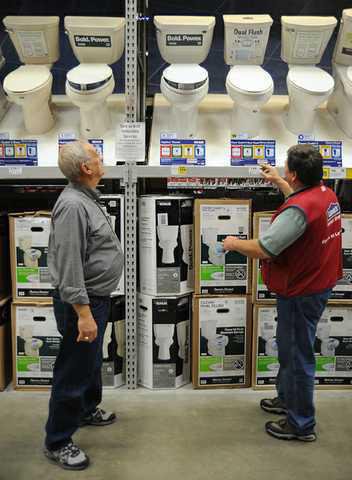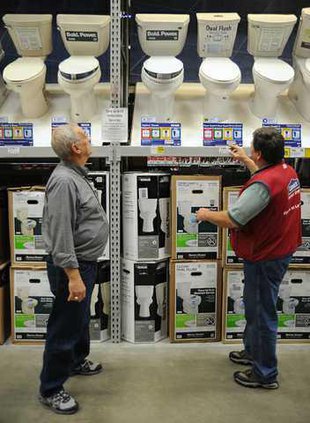Once a free-flowing society of water users, the tap turners in Hall County seem not to have forgotten what a threat their supply was under four years ago.
Files kept by the county's main purveyor of water show that water use in Gainesville never returned to the pre-drought free-for-all.
Since the drought that threatened the water in Lake Lanier — metro Atlanta's main water source — from 2007 to 2009, state officials have implemented a new water management plan, new laws for outdoor water use and mandated water efficiency on future industrial developments.
Even water bills look different, charging a higher rate for greater water use.
And something seems to have worked.
Clients of Fockele Garden Co. in Gainesville continue to seek out drought-tolerant landscape fixtures, said the company's landscape designer Stephanie Gordon.
"Clients are more interested in conservation and educated about conservation," Gordon said. "...I think that they want to create a landscape that is not going to require a lot of watering."
On an average day in July this year, city water customers used 4 million gallons less water per day than they did on an average day in July 2006.
In October, an average day this year resulted in the withdrawal of 17.97 million gallons of water from Lanier.
The same month in 2006 required about 19.06 million gallons a day, according to reports compiled by Gainesville's Public Utilities Department.
Now, as Lake Lanier inches toward the low levels it once saw in the previous drought, the alarms aren't ringing as loudly as they did in 2007 and 2008.
"I think the community here has got a pretty good grasp on (conservation)," said Brian Wiley, the environmental monitoring coordinator for Gainesville's Public Utilities Department. "I don't think there's as much panic as there once was before, because I think we've kind of prepped ourselves as a community and as a society to be ready for something like this."
Wiley and Jennifer Flowers are the two people solely responsible for teaching water conservation in Gainesville's Public Utilities Department. If you ask either of them, no one ever forgot about the drought.
"Since we're located so close to Lake Lanier, people pass over on a daily basis," Flowers said. "I think they start to notice that the lake is going down, and we hear when we go to schools and talk to the teachers and the kids, I feel like a lot of them are aware about the issues."
On any given week, Flowers and Wiley are in local schools teaching kids about the need to use water wisely.
"It's a serious message that kids get, too, and so by far our youth and our children are some of the best conservation crusaders that we have, because they send that message home," Wiley said.
A few times a year, they teach local residents to create their own rain barrels. Their workshops have resulted in the creation of at least 380 rain barrels since 2007.
Throughout the year, they promote a rebate program the city created in 2007 to encourage water customers to replace their water-guzzling plumbing fixtures.
Since 2007, the city has offered a $75 water bill rebate to customers who show they have replaced an old toilet with a water-efficient fixture. So far, 1,224 toilets have been replaced, they say.
Wiley said city officials will expand the program to owners of multifamily housing units next year.
And even without the threat of drought as imminent as it was in 2007, a sustained economic recession might also have people watching their water use inside and outside the home, Gordon said.
"I think people are more aware of the cost of water with the economy the way it is," Gordon said. "Even though the drought has let up a little bit, people are still watching what they spend their money on. There's a dollar drought, so to speak, so they're more conscious."




